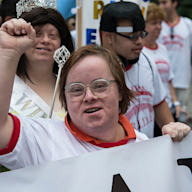Search results
The Americans with Disabilities Act of 1990 or ADA (42 U.S.C. § 12101) is a civil rights law that prohibits discrimination based on disability.
- Disability in The United States
People with disabilities in the United States are a...
- ADA Amendments Act of 2008
The ADA Amendments Act of 2008 (Public Law 110–325, ADAAA)...
- Disability in The United States
Here is the text of the Americans with Disabilities Act of 1990 (ADA), including changes made by the ADA Amendments Act of 2008. Congress passed the ADA as a “Public Law,” and it originally was in a different format than presented here.
- Title III: Public Accommodations
- Title IV: Telecommunications
- Title V: Miscellaneous
Who Is Covered by Title III?
Title III protects against discrimination by "public accommodations." Public accommodations are private organizations or people which own, lease, or run places meant for the public to use. Examples of public accommodations include: Title III also protects against discrimination by: 1. Transportation services provided by private companies 2. Commercial facilities (like office buildings, factories, and warehouses) 3. Private companies that give tests and teach classes to people who want educati...
What Do Public Accommodations Have to Do?
Allpublic accommodations have to do these things: 1. When a new building is built, the new buildings have to be accessible. 2. If a building is being "altered" (changed), the changes have to make things accessible, if possible. (For example, if a doorway is being moved, the new doorway must be wide enough for a wheelchair to get through.) But public accommodations do not have to make their changes accessible if that would add more than 20% to the cost of making the change. 3. Get rid of any b...
Complaints
If a person with a disability thinks that they have been discriminated against by a public accommodation, they can complain to the United States Department of Justice. They can write a letter, fax a letter, or use an online form at http://www.ada.gov/filing_complaint.htm. A few different things might happen after the person files their complaint: 1. The complaint might be sent to a mediation program. The person with a disability, someone from the public accommodation, and a mediator will all...
Who Is Covered by Title IV?
Title IV of the ADA protects against discrimination by telecommunicationscompanies in the U.S. (like phone companies). Title IV protects any person with a disability, but it focuses on people with speaking and hearing disabilities, because they have the most trouble talking by phone.
What Do Telecommunications Companies Have to Do?
Title IV says that all telecommunications companies in the United States have to make sure that people with disabilities have equal access to telecommunication. This means that they have to provide telecommunication services that are just as good as what people without disabilities get. For example, they have to: 1. Create relay services. A relay service is a way for a telephone operator to help a person with a speaking or hearing disability to call a regular phone. To do this, the person wit...
Complaints
Complaints about discrimination under Title IV go to the Federal Communications Commission (FCC).
Title V includes various other extra rules. For example, it says: 1. Nothing in the ADA changes or cancels anything in Section 504 of the Rehabilitation Act.Section 504 was the first law to give any civil rights to people with disabilities. 2. No one may be punished for using their ADA rights, or helping someone else use their ADA rights. (Punishin...
Aug 27, 2024 · Americans with Disabilities Act (1990), U.S. legislation that provided civil rights protections to individuals with physical and mental disabilities and guaranteed them equal opportunity in public accommodations, employment, transportation, state and local government services, and telecommunications.
1990 – The Americans with Disabilities Act became law, and it provided comprehensive civil rights protection for people with disabilities. Closely modeled after the Civil Rights Act and Section 504, the law was the most sweeping disability rights legislation in American history.
The Americans with Disabilities Act (ADA) is a federal civil rights law that prohibits discrimination against people with disabilities in everyday activities. The ADA prohibits discrimination on the basis of disability just as other civil rights laws prohibit discrimination on the basis of race, color, sex, national origin, age, and religion.
The ADA Amendments Act of 2008 (Public Law 110–325, ADAAA) is an Act of Congress, effective January 1, 2009, that amended the Americans with Disabilities Act of 1990 (ADA) and other disability nondiscrimination laws at the Federal level of the United States.




